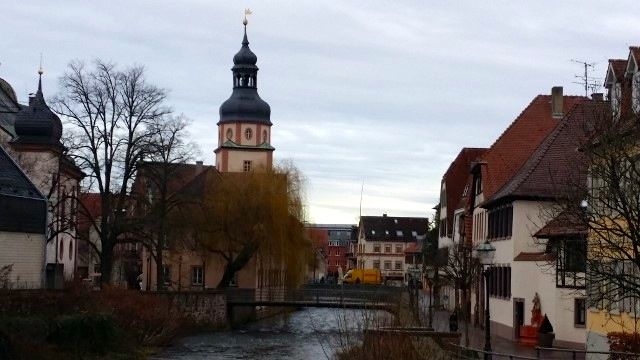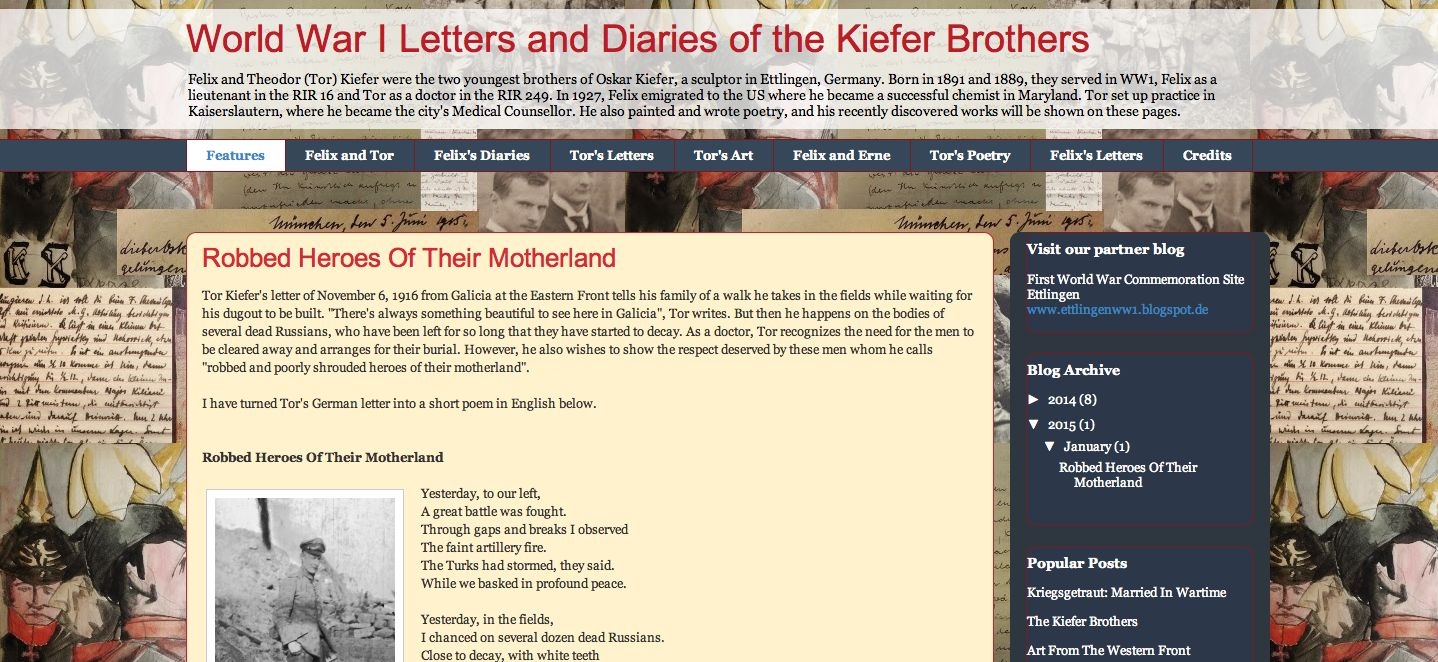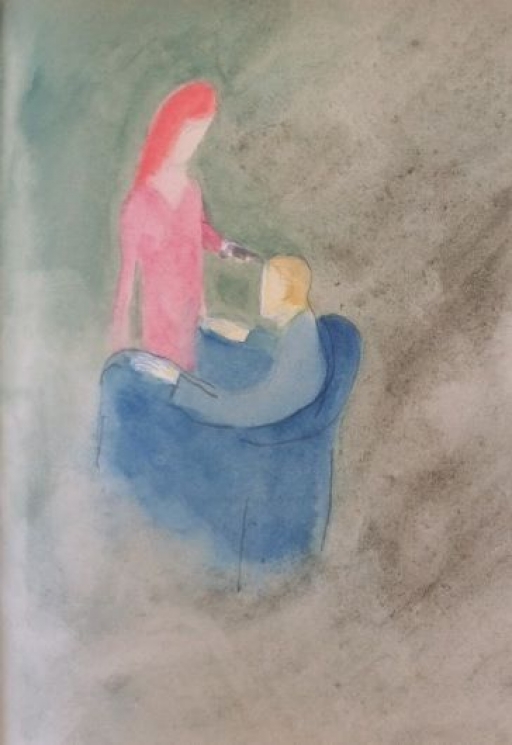Katherine Quinlan-Flatter reports from Germany on the discoveries which have inspired her to launch a new website devoted to the war experiences of the Kiefer brothers from Ettlingen, near Karlsruhe.
In February 2014, Centenary News featured the First World War commemoration website I had set up for my adopted German hometown of Ettlingen. In December, the website was awarded first prize in the Karlsruhe Culture Prize 2014 competition.
Now, as a result of subsequent research into hitherto untapped sources, I have been able to create a second site centering on two brothers from the town of Ettlingen, their personal War experiences and the art and poetry they produced during and directly following the War.
The original site, ‘First World Commemoration Site Ettlingen’, focuses on this small town near Karlsruhe and presents all the information I was able to rediscover about its history during the War.
 Ettlingen (Photo © Katherine Quinlan-Flatter)
Ettlingen (Photo © Katherine Quinlan-Flatter)
Through interviews with descendants, I collected stories of those men from Ettlingen who had fought at the Eastern and Western Fronts, and from the various memorials and cenotaphs I was able to amass lists of the names of the fallen.
In my year-long research, I was greatly assisted by our local municipal archive. The archive holds a wealth of material including newspapers of the day, letters from the Front and diaries.
Most of these letters stem from the estate of the Kiefer family, prominent and well-to-do Ettlingers of the age, who bequeathed the estate of one of their family members 40 years after his death during the mid-1970s. Since then, the estate had remained largely untouched and unread.
Kiefer père was a renowned architect in Ettlingen, while his oldest son, Oskar, was a sculptor with distinguished works commissioned in Baden-Baden, Karlsruhe and various cities in Switzerland.
While Oskar himself was not accepted for active service at the start of the war, being over age and hard of hearing, his two youngest brothers Theodor (Tor) and Felix both broke off their studies and signed up – Tor as a medic and Felix as an active soldier. Both survived the war, with Felix being promoted to the rank of Lieutenant and Tor, who passed his final medical examinations whilst serving at the Front, holding the position of deputy senior physician of his regiment.
Gifted
It is mainly Tor’s letters, still held by our municipal archive, which serve as the backbone and unique point of interest of my original site. Tor was a prolific and gifted writer, and his extremely regular and readable as well as balanced and dispassionate missives are a hitherto untapped source of war reporting – even hastily scribbled postcards seem to contain some information of historical value.
During the course of my research, I was able to contact the descendants of the Kiefer family, and the fruits of this contact proved twofold – resulting in the presentation to Ettlingen’s archive of Felix’s estate by his granddaughter in Washington, and in the discovery of Tor’s estate at the State Library of the Rhineland-Palatinate, where it had been kept since his death in 1985.
Felix married his sweetheart, Erne, during the war. In 1927, confronted with the poverty and hardship of the Weimar years in Germany, they made the decision to emigrate to the United States. Felix became a chemist and worked in New York, Carolina and Maryland.
His granddaughter, Francine, still held in her possession a trunk of his First World War diaries and the entire correspondence between her grandparents during the war years.

Excerpt of Felix Kiefer’s 1916 diary from the Eastern Front (© Francine Kiefer)
Francine delivered the estate, which numbered around 2,000 documents including First World War maps and other war paraphernalia, to Ettlingen’s municipal archives in September 2014. She hoped that the collection could be researched and thus attract the interest of historians and academics.
A few weeks later and quite incidentally, I discovered that Tor’s estate was held by the State Library of the Rhineland-Palatinate in the city of Speyer. Following the war, Tor had set up practice as a dermatologist in Kaiserslautern in the Palatinate, and during the 1950s was appointed senior medical counsellor of the city.
In addition to his medical work, Tor was a patron of the arts and a writer all his life, with various (mainly unpublished) novels as well as books of art criticism and philosophical/psychological works, several of which were published. The estate is held in a total of almost 50 boxes, and is unresearched.
An exciting new discovery was the estate’s revelation that Tor also produced a vast amount of moving and poignant poetry, from childhood right through to his mid-90s. Shortly before his death, he made every effort to have his work published, but was rejected by each publishing house he contacted.
Apart from its artistic quality, the poetry serves as a decade-long documentation or critique of the changing Germany as well as Tor’s life, from the early 1900s through two world wars and up to the technological breakthroughs of the 1980s. Much of it relates either directly to his war experiences or to the hardship of the years following – but what is clear is that Tor remained affected by the Great War for the rest of his life.
A further discovery yielded by the boxes in the library is Tor’s art, which is in evidence from the early years of the century until 1920. His closest friends included famous artists of various periods, including Georg Scholz, an expressionist painter of the German school of “new objectivity” of the 1920s.
Tor’s art exhibits talent and displays the influence of the artists with whom he must have spent his time. Several drawings and paintings have been made directly at the Front, and for this reason much of the art is a historical statement.
 It was clear to me that I would need a new site to showcase the newly discovered diaries, letters, poetry and art of the two brothers. I have therefore created the site ‘World War I Letters and Diaries of the Kiefer Brothers’ and hope that the stories and artistic works that these brothers have to offer will attract interest within the Centenary community.
It was clear to me that I would need a new site to showcase the newly discovered diaries, letters, poetry and art of the two brothers. I have therefore created the site ‘World War I Letters and Diaries of the Kiefer Brothers’ and hope that the stories and artistic works that these brothers have to offer will attract interest within the Centenary community.
© Centenary Digital Ltd & Author
